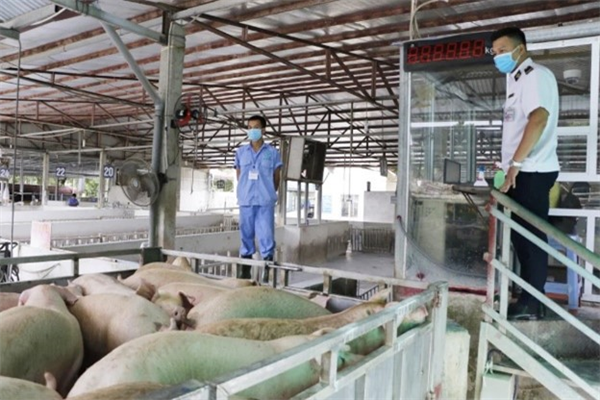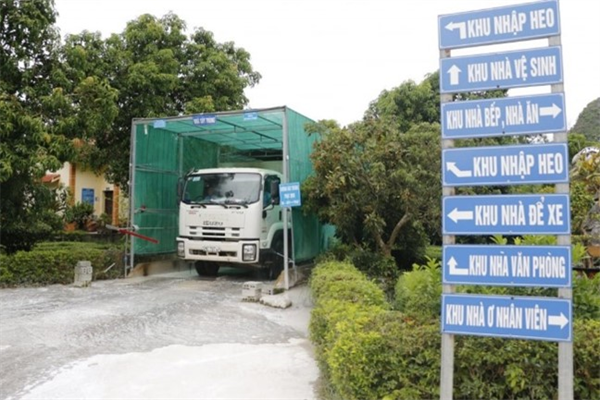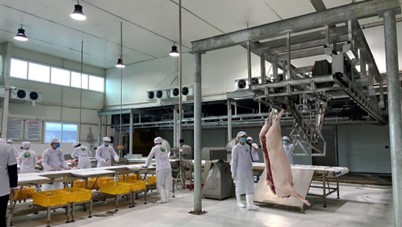As a key player in Vietnam’s pork industry, Mavin has primarily focused on feed and commercial production. However, it is now venturing into retail, emphasizing that ensuring food safety is its top priority in retailing. This is because, at this stage, producers will be directly dealing with the demands of consumers.
Retail is the most profitable segment in the pork value chain. However, many producers have stopped slaughtering and wholesaling because of logistical challenges. Solving these challenges will give them direct access to consumers.
Ensuring non-contaminated pork
The first step in ensuring non-contaminated pork is preventing sick and substandard pigs from entering the market. To achieve this, Mavin has established a series of transfer stations nationwide that serve as intermediate points between the farm and the slaughterhouse. At these stations, pigs are carefully inspected and selected before being transported to the final destination.
“Transporting pigs over long distances often causes stress, triggering several latent diseases, leading to poor health, meat quality, and higher loss rates,” the company said.
Moreover, pigs can catch diseases from the environment or through contact with dirty water during transport. With transfer stations, Mavin can minimize these risks.

| | 
|
| Local veterinary staff supervise pig weighing and classification. | | The pig stations comply with biosecurity standards to minimize risks of disease spread from the slaughterhouse to the farms and vice versa. |
How does a pork station work?
The station’s primary purpose is to shorten the distances pigs must travel from the farm to the slaughterhouse and improve the selection before delivery to customers (traders or retailers).
“The stations help us classify pigs carefully and provide our customers with convenient conditions when buying pigs,” the company said.
Each station operates as a sales hub with a slaughterhouse and storage facility. It takes 24 hours to receive, health check, and select pigs before sending them to customers.
The pigs are classified according to these criteria:
- Male and female: female pigs are usually preferred.
- Weight: Classification depends on the company’s sales strategy and customer requirements (under 70kg, 70-100kg, 100-110kg, 110-125kg, over 125kg).
- Health status: Pigs are inspected to ensure they meet sales criteria. Those in poor health (broken leg, fatigue, skin color issues) are either slaughtered or sold as lower quality. Pigs that do not meet slaughter standards due to diseases are culled.
The primary purpose of the stations is to ensure pigs are healthy and in good condition, allowing producers to sell at higher prices and build credibility.
Besides Mavin, other key players like CP Vietnam, Japfa Comfeed, and MM Mega Market have adopted the same strategy. This collaborative approach not only ensures the success of individual companies but also fosters a sense of inclusion and shared responsibility among the stakeholders.
Complete logistics for retailing
MM Mega Market, which owns the brand ‘We Are Fresh’, is a professional retailer offering extended pork station services.
In December 2022, it inaugurated its second pork station in Vietnam, covering 5000m2, including a lairage, slaughter area, and packaging area.
The company partners with over 200 VietGAP-certified farms and cooperatives to supply 30 tons of clean, traceable pork daily to its Horeca customers nationwide. It coordinates a team of engineers and experts to inspect and monitor food safety regularly.

Pork stations typically include a slaughterhouse and cold storage to ensure meat quality.
Their stations also handle cutting, packaging, and refrigerated transport. All meat cuts are stamped with a QR code for traceability.
“This system not only ensures a constant supply of high-quality products at competitive prices for MM’s customers but supports sustainable farming practices in Vietnam’s value chain,” said Bruno Jousselin, CEO of MM Mega Market.
“We will keep growing our partnerships to provide our customers a steady supply of clean, top-quality pork products at good prices,” he added.
----------------------------------------------------
Ha Thu
Regional Correspondent and Assistant Editor, Asian Pork Magazine, Ho Chi Minh City, Vietnam. Ha Thu’s ‘Income from waste, the next big thing in animal production’ explores how processing livestock waste can be an environmentally sustainable, income-generating solution.